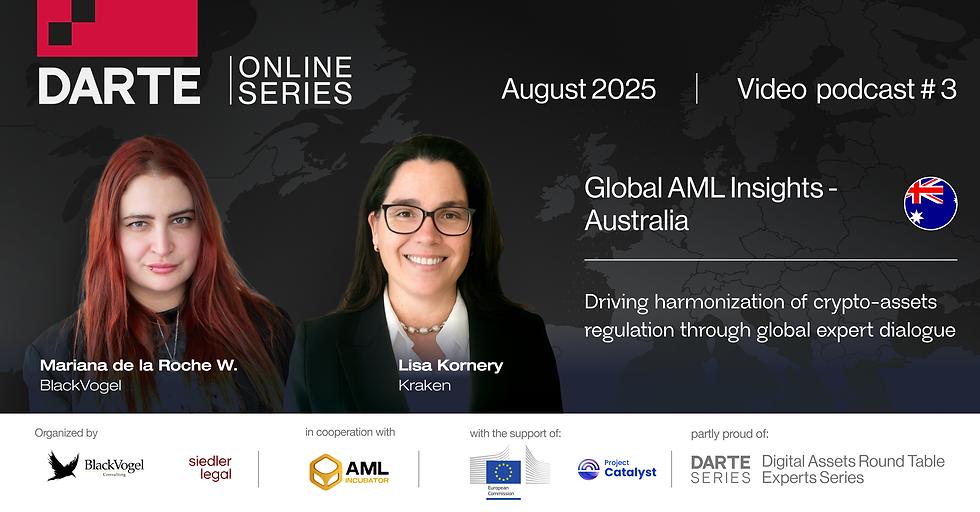DARTE Goes Digital: Episode 3 with Lisa Hornery on Australia’s Compliance Landscape
- Mariana de la Roche
- Aug 22, 2025
- 2 min read
Updated: Aug 26, 2025
In the latest episode of the DARTE Online Series, we had the pleasure of speaking with Lisa Hornery, Regional Compliance Officer at Kraken, who joined us from Australia to explore the country’s evolving regulatory landscape for crypto assets.
Lisa’s career spans the full arc of financial compliance, from writing trade chits on the floor of the Sydney Futures Exchange to shaping compliance programs for one of the world’s leading digital asset exchanges. Her diverse background in surveillance, investment banking, and exchange operations gave us a rare, 360° view of how traditional finance has informed the growth of crypto compliance.

Below, we highlight some of the key topics covered during our conversation.
Australia’s Regulatory Framework Is Still Evolving
Australia currently only requires registration with AUSTRAC, the country’s AML/CTF regulator. ASIC, the corporate and financial regulator, is still working on defining the legal treatment of digital assets under the existing financial services laws. A long-awaited consultation paper is expected to clarify which crypto products fall under financial product classifications, with stablecoins, meme coins, and staking facilities among the complex topics under review.
AUSTRAC Is Active – and Getting More So
Lisa confirmed that AUSTRAC has become more engaged in enforcement. Just hours before our webinar, AUSTRAC ordered Binance Australia to appoint an external auditor to assess its AML/CTF processes. AUSTRAC also conducted in-depth reviews (“roadshows”) with exchanges in early 2024, requesting detailed walkthroughs of internal AML programs. While not formal audits, these engagements highlight AUSTRAC’s growing scrutiny and proactive stance.
Industry-Led Standards Are Filling Regulatory Gaps
With many regulatory uncertainties still in play, exchanges are self-imposing high compliance standards to attract and retain users. From internal audits and transaction monitoring to travel rule preparations and attestations for self-hosted wallets, many actors in Australia are adopting best practices in anticipation of more rigorous future requirements.
DeFi and Self-Hosted Wallets Pose New Challenges
Lisa acknowledged the difficulty of applying traditional AML expectations to decentralized finance. Still, there are discussions underway, both in industry groups and with AUSTRAC, about how to approach value transfers involving DeFi platforms or self-custody. Attestations and wallet verification methods are being considered, but implementation remains resource-intensive and inconsistently addressed across the sector.
As Australia prepares to revise its AML/CTF rules by March 2026, bringing crypto and property fully under the scope of value transfer rules, this episode offers valuable insight into how one of the world’s most influential crypto compliance leaders is navigating a landscape in flux.
🎥 Watch the full conversation here: https://youtu.be/h7VKottORp8
🖤 Powered by BlackVogel, siedler legal, AML Incubator & Project Catalyst with the support of the EU Commission



Comments